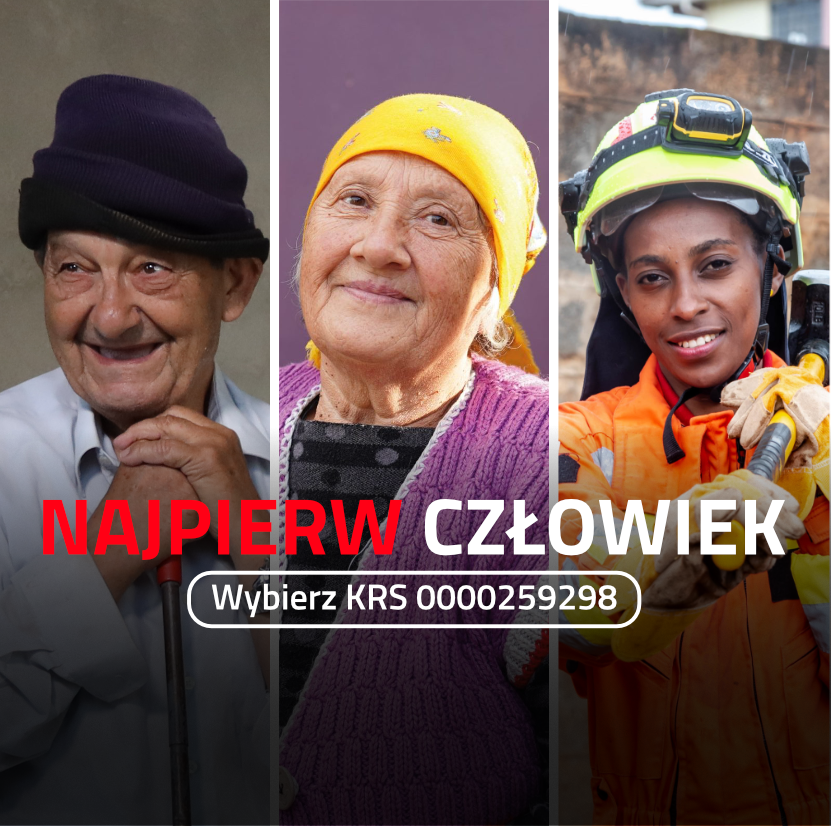2024 Year of PCPM in Pictures: Aid on Three Continents


In East Africa, we are developing emergency services. In Palestine, we provide access to healthcare. In Ukraine, we offer shelter, medication, and humanitarian aid packages. We support families in the most challenging situations in Lebanon. In South Sudan, we save the youngest. We assist Ukrainian refugees in Poland. Over the past twelve months, we have operated on three continents. You can choose PCPM when filing your PIT each year by entering KRS 0000259298.
We rebuild destroyed homes, deliver food and medicine packages, and restore public services. We supply fire stations, clinics, and social welfare homes. Our volunteers reach villages even near the front lines, where mainly elderly, lonely individuals and those with disabilities remain.

In South Sudan, plagued alternately by drought and floods, we help malnourished children. Using a special therapeutic peanut-based paste, we save the youngest from starvation. Currently, this is the largest humanitarian crisis in the world. Due to the war in neighboring Sudan, millions have fled their homes. A significant number of refugees seek safety in South Sudan. We operate a Nutrition Center in Gordhim near Aweil and a mobile clinic at the border with Sudan.

We have provided financial assistance, helped find shelter and jobs, conducted language and vocational courses, and assisted in the recognition of diplomas for teachers from Ukraine. In Warsaw, we run the PCPM Education Center for children and youth from Ukraine with a Ukrainian curriculum.

At Rzeszów-Jasionka Airport, we operate a MEDEVAC HUB – a unique transit center for patients from Ukraine. This stop is part of the medical evacuation system for individuals transported from Ukrainian hospitals for specialized treatment across Europe. Specialists from the PCPM Medical Emergency Team are continuously engaged in patient assistance. The HUB was established as an initiative of the Ministries of Health of Poland and Ukraine and is funded by the EU Civil Protection Mechanism.

We are developing emergency medical services in Tanzania. Rescuers are acquiring new skills; more people can provide first aid and specialized care as the system evolves. We created the Tanzania-Poland Training Center for Emergency Medicine in Dar es Salaam at The Aga Khan Health Service (AKHST) hospital, the largest city in Tanzania. It is the most modern center in the country, equipped with professional training equipment.

Since 2014, we have been systematically transforming firefighting services in Kenya. We train and build fire stations. From scratch, we established a Firefighting and Rescue Training Center in Kiambu. The first firefighters received state diplomas as “firefighters.” We have trained about 70% of firefighters and firewomen in the country. We improve road safety by building and renovating fire stations along the East African transport corridor – Mombasa-Nairobi-Uganda road.

In Lebanon, since 2012, we have been helping Syrian refugees. We also support Lebanese families affected by the largest economic crisis in decades. We deliver food and hygiene packages, provide shelter, prepare facilities for winter, and ensure clean water and electricity supply. We repair damaged roads and build irrigation systems.

We support building a medical rescue system in Ethiopia, including the Ethiopian Medical Emergency Team. This group provides medical assistance to victims of conflicts, natural disasters, epidemics (including cholera and dengue), and refugees at the border with Sudan. We also enhance fire service quality by training instructors and ambulance medics who receive professional equipment.

We train medics and instructors while supporting mobile clinics that can reach small towns with assistance. We provide first aid kits and specialized diagnostic equipment. Residents of the West Bank gain access to healthcare. Over half of the West Bank is classified as Zone C – an area managed and controlled by Israeli authorities where Palestinian authorities cannot build clinics; thus, mobile clinics are their only chance for healthcare access.

